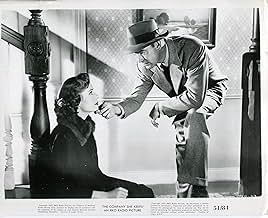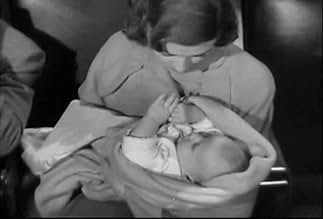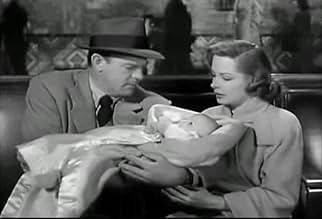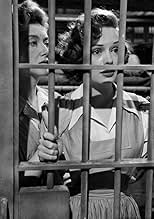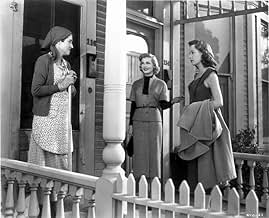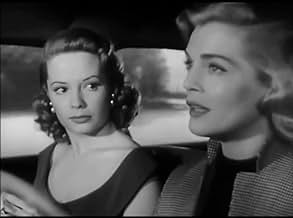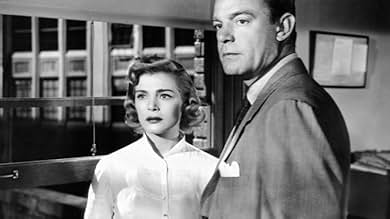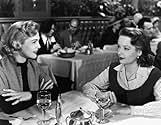IMDb RATING
6.3/10
672
YOUR RATING
A female ex-convict meets a handsome man and they start dating, but she jeopardizes their relationship by not telling him that she was in prison--and he doesn't reveal his involvement with h... Read allA female ex-convict meets a handsome man and they start dating, but she jeopardizes their relationship by not telling him that she was in prison--and he doesn't reveal his involvement with her parole officer.A female ex-convict meets a handsome man and they start dating, but she jeopardizes their relationship by not telling him that she was in prison--and he doesn't reveal his involvement with her parole officer.
Eric Alden
- Sergeant of Detectives
- (uncredited)
Parley Baer
- Steve
- (uncredited)
Larry Barton
- Store Detective
- (uncredited)
June Benbow
- Myrtle
- (uncredited)
Lela Bliss
- Window Shopper
- (uncredited)
Gail Bonney
- Nurse
- (uncredited)
- Director
- Writer
- All cast & crew
- Production, box office & more at IMDbPro
Featured reviews
The film begins with the parole board meeting at a woman's prison. They are discussing Diane Stuart's case. She's granted parole and moves to Los Angeles. Once there, she's met by her new parole officer, Joan Wilburn (Lizbeth Scott). The p.o. is VERY positive and friendly--unrealistically so, actually. She seems more like a cheerleader than an officer of the court. All this occurs while Diane acts as if she'd rather be anywhere than with Joan. Pleasant, she is not.
While Diane does okay on parole, she is a conniver. When she sees Joan with her boyfriend, Larry (Dennis O'Keefe), she decides to get him for herself and slowly he falls for her. However, unexpectedly, she falls for him as well. Here is where is gets more ridiculous--Joan isn't thrilled by all this but is super-supportive and pushes to get the pair permission to marry. As for Diane, she's broken-hearted and expects the worst. What's next?
When the film began, I loved Greer's character. She was wonderfully noir--with a bad attitude and a hard edge. But, when she suddenly actually fell for Larry AND her p.o. was so supportive, the film felt very sappy...and lame as well as VERY inconsistent. Up until then, I would have given this one an 8 or 9. How could they have screwed up so badly?!
While Diane does okay on parole, she is a conniver. When she sees Joan with her boyfriend, Larry (Dennis O'Keefe), she decides to get him for herself and slowly he falls for her. However, unexpectedly, she falls for him as well. Here is where is gets more ridiculous--Joan isn't thrilled by all this but is super-supportive and pushes to get the pair permission to marry. As for Diane, she's broken-hearted and expects the worst. What's next?
When the film began, I loved Greer's character. She was wonderfully noir--with a bad attitude and a hard edge. But, when she suddenly actually fell for Larry AND her p.o. was so supportive, the film felt very sappy...and lame as well as VERY inconsistent. Up until then, I would have given this one an 8 or 9. How could they have screwed up so badly?!
Scott and Greer are very good in this "woman gets out of prison" movie that could have been awful. Cromwell directs crisply and many shots are well lit and evocative. This may or may not be film-noir, depending on the viewer's perspective, but it holds up well. If you can find it on TV, it is well worth taping, since it is not easy to find on video.
Parole officer (Scott) and parolee Diane (Greer) compete for the same man (O'Keefe), creating conflict on several levels. At best, the movie's about the difficulties of being on parole.
Oddball little programmer. Scott gets top billing, but as others point out, it's Greer who gets the screen time. And far from her usual slinky seductive role, she's not only de-glamorized, but also suitably dour-faced (just count her smiles; I stopped after one). All in all, it's a rather grim screenplay, drably photographed, and I can't believe the studio expected the final product to make money.
Despite the romantic triangle that strains believability, there are several striking scenes. Catch the iconic 40's diner where Diane gets her bottom-of-the-barrel meals. The sweat and steam just about drip off the wall. And that police line-up-- a graphic cross-section of the city's tough cookies, down-and-out'ers, and hopelessly pathetic (& one of the few barfing scenes from that era)-- are all herded along by a bullying cop (Freed). It's one of the more unvarnished glimpses of urban flotsam and jetsam from the period. Then there's the crowded jail cell where the camera abandons Diane (& us) to a nightmare of entrapment. It's an unnerving moment, very well done.
I would've liked the movie better had they made the triangle more credible, plus Scott's sacrificial character seems too good to be true. I expect the latter was RKO's effort at compensating for the harshness of the parole system as portrayed. Likely too, prestige producer John Houseman had something to do with the social realism phase, including the poignant overcoat episode. Anyway, reviewer bmacy's remarks on the influence of the previous year's Caged (1950) are on target. And, had this film carried through more with its realistic dimension, it might not be as obscure as it is.
Oddball little programmer. Scott gets top billing, but as others point out, it's Greer who gets the screen time. And far from her usual slinky seductive role, she's not only de-glamorized, but also suitably dour-faced (just count her smiles; I stopped after one). All in all, it's a rather grim screenplay, drably photographed, and I can't believe the studio expected the final product to make money.
Despite the romantic triangle that strains believability, there are several striking scenes. Catch the iconic 40's diner where Diane gets her bottom-of-the-barrel meals. The sweat and steam just about drip off the wall. And that police line-up-- a graphic cross-section of the city's tough cookies, down-and-out'ers, and hopelessly pathetic (& one of the few barfing scenes from that era)-- are all herded along by a bullying cop (Freed). It's one of the more unvarnished glimpses of urban flotsam and jetsam from the period. Then there's the crowded jail cell where the camera abandons Diane (& us) to a nightmare of entrapment. It's an unnerving moment, very well done.
I would've liked the movie better had they made the triangle more credible, plus Scott's sacrificial character seems too good to be true. I expect the latter was RKO's effort at compensating for the harshness of the parole system as portrayed. Likely too, prestige producer John Houseman had something to do with the social realism phase, including the poignant overcoat episode. Anyway, reviewer bmacy's remarks on the influence of the previous year's Caged (1950) are on target. And, had this film carried through more with its realistic dimension, it might not be as obscure as it is.
Lizabeth Scott is OK here, & I'm a big fan of hers, but I would have liked her better in the role of Diane (played by Greer). Scott is just too sugary sweet in her role as a Parole Officer Angel. On the other hand, I kept waiting for Greer's character to wake up & smell the coffee, but she really never did, & that's what makes this film a cut above similar soapers of this kind. Greer is excellent as a sneering, eye-rolling bad girl who just doesn't care about those trying to help her or society, & really doesn't even care about herself. I rate it 6/10. I would have rated it higher if not for Scott's too sweet character & the happy pat en
I fell for Lizabeth Scott in Too Late for Tears, and she's delicious here as a tortured altruist. But it's Jane Greer as the broken dove who has a the limelight for the first two acts. The shades of gray--and green--make this a juicy little melodrama for both characters. Indeed, the lesbian tension is palpable in the beginning (and I didn't know about Scott's reputation), suggesting much more than the film makers may have intended (but, oh, what a movie this COULD have been...). Dennis O'Keefe is the weak link, looking older than his 43 years and strolling thru scenes without adding much flavor. Fay Baker is a nice addition as the tough girl that Greer might have been without the help she gets.
Did you know
- TriviaAt one point, four month-old Jeff Bridges, playing the baby Jane Greer is holding in the train station, was supposed to cry. To get him to cry, Jeff's mother, Dorothy Dean Bridges, suggested they pinch him.
- ConnectionsFeatured in 2019 Golden Globe Awards (2019)
- How long is The Company She Keeps?Powered by Alexa
Details
- Release date
- Country of origin
- Language
- Also known as
- The Company She Keeps
- Filming locations
- 114-116 North Hope Street, Los Angeles, California, USA(Diane Stuart's apartment building)
- Production company
- See more company credits at IMDbPro
- Runtime
- 1h 22m(82 min)
- Color
- Aspect ratio
- 1.37 : 1
Contribute to this page
Suggest an edit or add missing content

